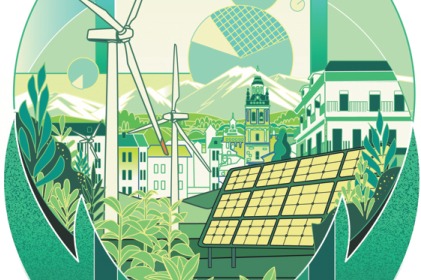Time for reflection
Renewing global consensus on peace and development is essential in the face of today's pressing challenges


This year marks the 80th anniversary of victory in both the Chinese People's War of Resistance Against Japanese Aggression (1931-45) and the World Anti-Fascist War. Eight decades ago, people around the world made immense sacrifices to defeat fascism, ushering in an international order centered on the United Nations and a global consensus rooted in peace and development. But the world has been confronting severe challenges since the end of the Cold War. The looming shadow of war, the fragmentation of the international order and the collapse of trust among nations are testing whether human society can safeguard the foundations of peace and development.
First, the peaceful global landscape is deteriorating at an alarming rate. According to the Global Peace Index 2025 released by the Institute for Economics & Peace in June, the average level of global peacefulness has declined for the 13th time in 17 years, representing the sixth consecutive annual deterioration. Fifty-nine active state-based conflicts are now underway worldwide — the highest number recorded since World War II — while conflict resolution through peace agreements has reached a historical low.
The report further underscores that intensifying global arms races, economic fragmentation, and the breakdown of international rules-based systems are creating conditions conducive to large-scale conflicts, pushing the international order toward a dangerous tipping point.
Second, new geopolitical conflicts continue to emerge. In May, military clashes erupted between nuclear-armed India and Pakistan. This was followed in June by intense exchanges of fire between Israel and Iran and airstrikes on Iranian nuclear facilities by the United States. Both conflicts proved short-lived, but if they should erupt again and escalate uncontrollably, they could trigger a nuclear war, with catastrophic consequences.
On President Donald Trump's return to the White House this year, the US imposed sweeping tariffs on all its trading partners. These measures delivered significant shocks to the global trade system and capital markets. Authoritative institutions including the World Trade Organization and the International Monetary Fund have warned that Trump's trade war would reduce the volume of global trade and slow global economic growth, heighten recession risks, undermine the multilateral trading framework, and have lasting impacts on the global supply chains and macroeconomic stability. The WTO warned in April that the volume of world merchandise trade is likely to fall by 0.2 percent in 2025, and the decline could be even steeper, falling by 1.5 percent, if trade tensions worsen. Nevertheless, Trump has demonstrated no intention of changing his approach; on the contrary, he recently announced a new round of tariffs set to take effect on Aug 1.
History offers a precedent for this development. After the 1929 economic collapse, the US Congress passed the Smoot-Hawley Tariff Act in 1930, drastically hiking US import duties. This provoked widespread retaliatory tariffs from other nations, resulting in a sharp contraction of global trade that worsened the Great Depression. While today's international economic architecture is more complex and institutionally robust than in the 1930s, escalating politicization of the economy, "decoupling" tendencies, and technical barriers continue to erode the foundations of global trust and cooperation. In today's world of deeply integrated supply chains, efforts to suppress competitors through economic coercion to preserve national hegemony will prove counterproductive: far from helping to resolve problems, such tactics create uncertainties globally and pose additional risks to an already fragile geopolitical landscape harming all economies.
The lessons of World War I and World War II demonstrate that preventing trade conflicts from spiraling into vicious cycles and curbing the excessive weaponization of economic relations are vital for global stability and peace. Moreover, bloc confrontation, alliance expansion or the pursuit of "absolute security "inevitably draw more nations into conflict, escalating the scale of intensity. Therefore, we must recognize that more than ever before true security is common security, and genuine victory arises only from win-win cooperation.
In the current global landscape, upholding peace and development necessitates that the international community forge a renewed, responsible consensus on cooperation.
First, it's imperative to prevent the Cold War mentality and to guard against the resurgence of bloc politics.
Nations must categorically reject forming exclusive alliances or engaging in bloc confrontation. It is imperative to avoid strategic miscalculations and security dilemmas, and steadfastly adhere to a vision of common, comprehensive, cooperative and sustainable security. Recent developments, such as the establishment of AUKUS (the US-the United Kingdom-Australia) alliance, along with attempts to extend NATO's reach into East Asia, epitomize the dangerous revival of bloc-based confrontation — a trend warranting heightened vigilance.
Second, it's imperative to reject the pursuit of absolute security.
Pursuing security advantages at the expense of other nations' safety — whether through alliance expansion, erosion of strategic stability and international arms control regimes, or development of missile defense and even space-based defense systems — invariably provokes backlash, escalates tensions, and fundamentally compromises one's own security. The Ukraine crisis, ignited by the US and Europe-driven NATO eastward expansion, stands as a grim lesson in self-defeating security pursuits.
Third, it's imperative to oppose economic coercion and technological containment.
Economic globalization represents an irreversible historical tide, wherein trade operates not as a zero-sum contest. Countries must therefore reject leveraging technological or market supremacy to coerce others, refrain from waging punitive tariff wars, or resist dismantling the global economic architecture into rival blocs. Under the guise of domestic legislation such as the CHIPS and Science Act, the US has orchestrated with allies to impose export controls on advanced semiconductors to China while pursuing a "geopolitical realignment" of technology supply chains. These measures contravene the principles of global free trade and will ultimately harm the US' own economic interests. The self-defeating nature of such trade war tactics — fueling inflation, stifling growth and triggering retaliatory cascades — will inevitably recoil on itself.
Fourth, it's imperative to uphold UN-centered multilateralism.
Forged in the crucible of the World Anti-Fascist War, the UN remains the cornerstone of the post-war global governance system and a vital guardian of the rules-based international order. Any erosion of its authority or marginalization of its role accelerates the corrosion of the world order and risks unleashing greater instability. Only through reinforced dialogue, coordination, and institutional development within the UN framework can conflicts be effectively mitigated and disputes peacefully resolved.
The author is an associate research fellow at the Institute of American Studies at the Chinese Academy of Social Sciences. The author contributed this article to China Watch, a think tank powered by China Daily.
Contact the editor at editor@chinawatch.cn.
































